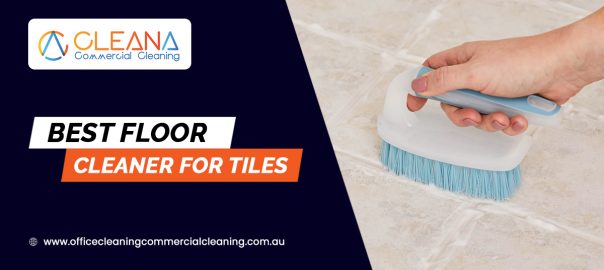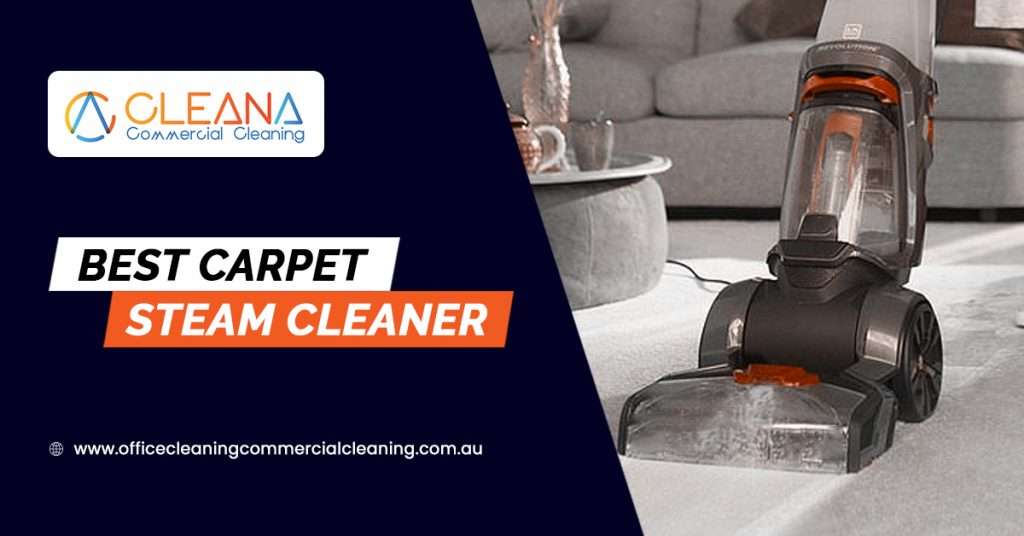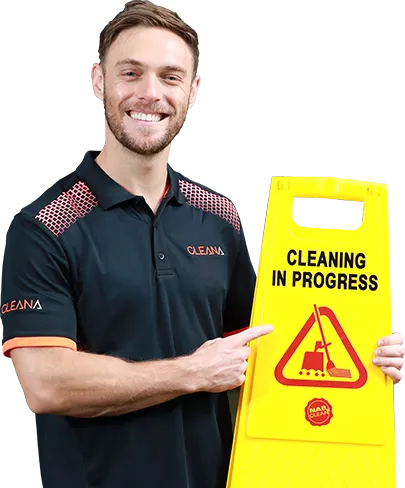Keeping your tile floors clean is all about routine, but you won’t get far without a decent floor cleaner that’s designed with tiles and other hard surfaces in mind. It can be easy not to realize just how much dirt your tile floors or walls are acquiring, especially since you won’t see much change in color, unlike with carpets. Regular cleaning is key.
If you’re looking for a floor cleaner suitable for tiles, there are heaps of choice out there, so it can be hard to know which brand to go with. As well as the overall effectiveness of the floor cleaner, you might also be considering other factors, such as the fragrance, whether it’s non-slip, or how shiny it’s going to make your tiles.
The following article will break down our top picks for tile floor cleaners by looking at each of their pros and cons, before providing a guide to what buyers should be looking for or looking to avoid. We, CLEANA commercial cleaning services company will also be answering some of the most frequently asked questions regarding floor cleaners for tiles.
Rejuvenate Floor Restorer
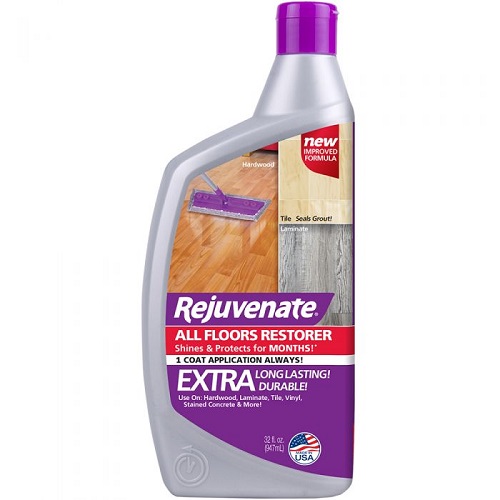
Some floor cleaners are designed exclusively for quick cleaning, but Rejuvenate Floor Restorer goes the extra mile in restoring your tile floor. It’s designed to hide small scuffs and scratches in order to give your tiles a smoother look.
This dilutable floor cleaner, which is designed for all types of hard flooring, is most recommended for small areas. The bottle is only 500 milliliters, which is its only downside if you’re hoping to clean a large area of tiles.
Rejuvenate Floor Restorer takes just 45 minutes to dry, is designed to last for months, and will also add UV protection to your tiles.
Pros
- Hides scuffs and scratches: Rejuvenate does more than just clean your tiles, certainly living up to its name by restoring tiles with unsightly scratches.
- Works on all hard surfaces: It’ll work on every kind of hard surface, whether it’s tiles, hardwood, vinyl, laminate, terracotta, or linoleum.
Cons
- Small bottle: If you require a larger scale cleaning, you might need to get more than one bottle of Rejuvenate, in which case it might be more affordable to buy a larger bottle of another brand.
Aunt Fannie’s Hardwood Floor Cleaner, Bright Lemon
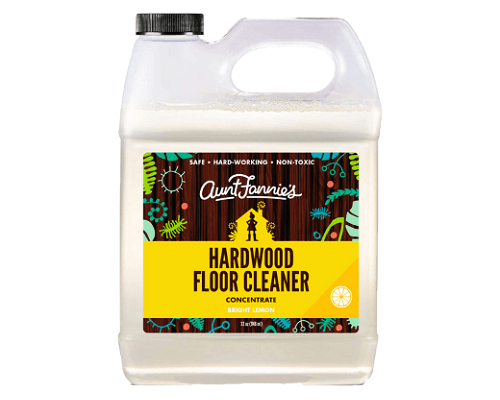
This cleaner is designed to make your hardwood floors as clean as can be and smell great in the process. It’s a concentrated, vinegar-free solution that will tackle grime, grease, dirt, and food. The 100% essential oils blend makes for a very pleasant fragrance, with no lingering hints of chemicals.
It’s safe to use around pets and around kids and can be applied to any hardwood floor. We most recommend it for use with a microfiber mop- if you’ve got a steam mop this will most likely work too, but you should double-check with the mop’s manufacturer.
Pros
- Smells great: A lot of floor cleaners and other cleaning products come with an overpowering chemical smell, but that’s not an issue here.
- Suitable for kids and pets: You won’t have to worry about your pet licking your newly cleaned floor, as they won’t be exposed to any toxic chemicals.
Cons
- May leave a film on wood floors: There have been some reports from customers that on hardwood floors the floor cleaner leaves a film, but this problem could be solved by adjusting the measurements when diluting.
Dr. Beckmann Stone & Tile Floor Cleaner
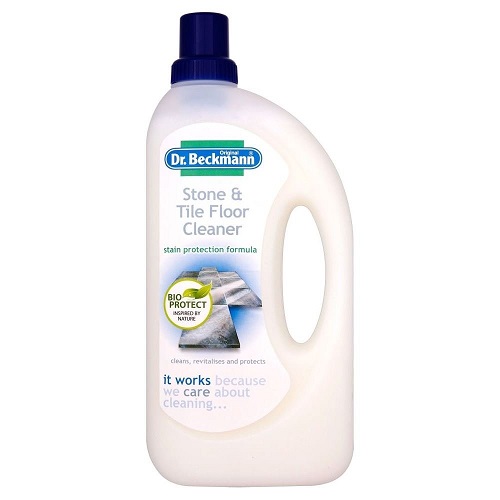
Perfect for cleaning all kinds of hard flooring, Dr. Beckmann Stone & Tile Cleaner will provide your floors with a protective layer in order to prevent staining or wear and tear. All that’s required to use it is adding water.
While it’s not going to be the best product for cleaning existing stains, it will help to hold off stains for the foreseeable. The size of the bottle is one litre, so it should last you for a considerable amount of time.
Pros
- Gives your tiles a protective layer: Dr. Beckmann Stone & Tile Floor Cleaner will help to protect your flooring from future stains, more so than other brands.
- Leaves a natural shine: Applying this floor cleaner will have your floors looking good as new.
Cons
- Prevents stains, but doesn’t necessarily remove them: While it will certainly help with removing stains, the product was designed for preventing future stains, so it might not do away with them entirely.
Bona Stone Tile & Laminate Floor Cleaner
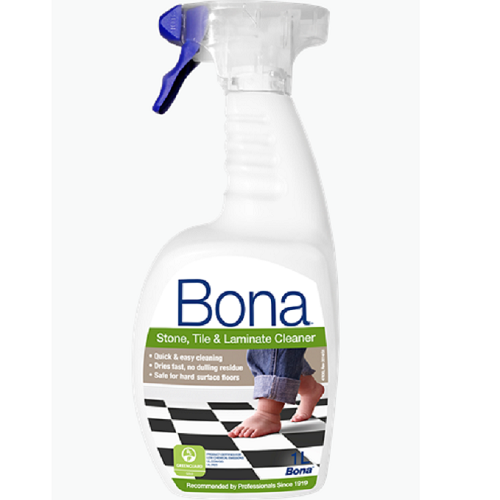
The Bona Stone Tile & Laminate Floor Cleaner is an ideal choice for all hard surface floors, including vinyl, ceramic, and laminate. It’s water-based, dries fast, and is safe for use around kids and pets. It’s also a spray bottle, meaning it won’t require any preparation or hassle.
You’ll be getting one litre of spray in the bottle, which should last for a considerable amount of time. When you do run out, though, you’ll be able to buy a refill bottle rather than needing to buy another spray gun.
Pros
- Zero residues: The product is water-based and won’t leave any residue on your floors. The same cannot be said for a number of floor cleaners.
- Protects against discolouration: It also prevents discolouration in your tiles, which will ultimately increase their lifespan.
Cons
- May require multiple applications: There have been some reports from customers that the product can require more than one application for the best results, but this would be less of an issue considering just how much is in the bottle.
Cif Floor Cleaner
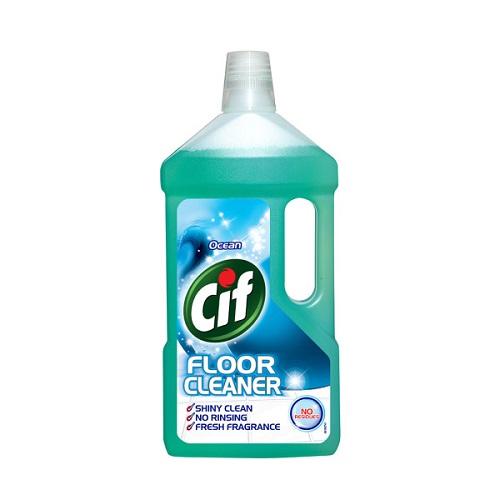
Cif Floor Cleaner is great if you’re wanting less of a quick clean and more of a deep clean. It’s a one-litre bottle ideal for large spaces, and all that’s required is to add some water. One thing customers love about Cif Floor Cleaner is that it never leaves smears or residue, which can’t be said for many cleaning products.
Pros
- Perfect for heavy-duty cleaning: If you’re eager to buckle down and clean all the tile flooring in your house, Cif Floor Cleaner will get the job done.
- Zero residues or smearing: Some cleaning products tend to leave some residue, meaning you have to go over the surface again- with this floor cleaner you won’t have to put up with this.
Cons
- Shine could be better: While it’ll go far in cleaning your tiles, they won’t leave as much shine as certain other products. This is a personal preference thing, obviously- if your tiles are in a place that doesn’t get much natural light, you might not even notice the difference compared to other brands.
Stone & Tile Intensive Cleaner: Concentrated Deep Cleaner
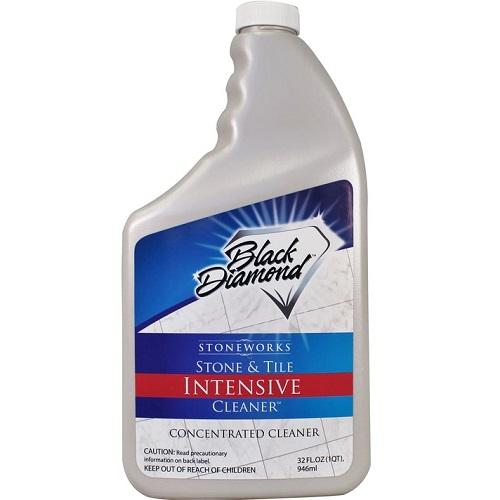
This floor cleaner from Black Diamond Stoneworks is designed for safe deep cleaning on all hard surfaces. It’s made with no harsh chemicals, abrasives, acids, alkali, or petroleum solvents.
The product is also compact by design, meaning it’s more climate-friendly than alternatives. There’s less packaging, and the shape of the container is more efficient.
Pros
- Works on all hard surfaces, including stone: It’s a very versatile floor cleaner. There are a variety of hard surfaces you’ll be able to clean with this product, including marble, grout, granite, slate, travertine, limestone, brick, and concrete.
- Climate-friendly: The packaging does its part in helping the environment.
Cons
- Not very effective on specific stains: Some customers report that while it’s generally an effective product for cleaning surfaces, you won’t have as much luck with specific stains, such as the soot surrounding a fireplace.
Floor Cleaner For Tiles: Buyer’s Guide
There are a number of factors to consider when you’re in the market for a tile floor cleaner.
These include the kind of tiles you’ll be cleaning (both the material of the tiles and whether they’re floor tiles or wall tiles), the product’s safety information, the size, the price point, the difference between stain prevention and stain removal, and whether the product is dilutable or non-dilutable.
The following will break down each of these factors in order to help you decide which floor cleaner is best for you.
The Kind Of Tiles (Floor Or Wall/Material)
You might need different products depending on whether you’re cleaning floor tiles or wall tiles. The main thing to be looking for is whether the product is non-slip.
This will be something to consider when you’re cleaning floors, especially if the product takes a long time to dry. But if you’re cleaning wall tiles, this will be less of an issue (unless you’re Spider-Man, but you’re probably not Spider-Man).
For floor tiles, you should be looking for a product that can be diluted and applied with a mop. If you’re cleaning wall tiles, spray bottles will be ideal, but there’s nothing stopping you from using a spray-on floor tile as well.
Similarly, you’ll need to consider the material that your tiles are made from. Tiles that are marble or granite will be more at risk of staining.
With these kinds of tiles, you should also be wary of cleaning products that might strip off any sealing that’s been applied to the tiles. Make sure to check the instructions on your bottle before using any cleaning product that you’re unfamiliar with.
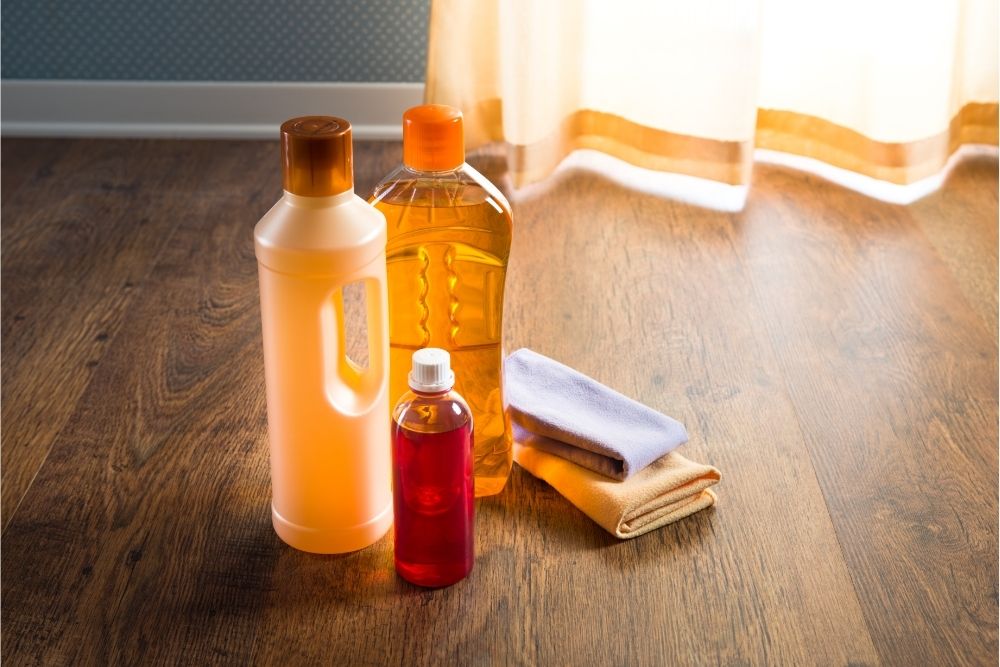
Safety Information
Some cleaning products will only be safe once they’re fully dry because they contain chemicals that could be harmful to children or pets. This is less of an issue if you don’t have either children or pets, but it’s something to be aware of regardless, so always check the label.
Size
The size of the bottle is also something to consider. A bottle that’s only 500ml might seem like the cheaper option compared to a larger bottle, but you might be better off paying more for a larger bottle if your tiles cover a large area.
Stain Prevention Vs Stain Removal
It’s important to know the difference between a floor cleaner that offers stain prevention versus one that offers stain removal. A product designed to prevent stains will help to prolong the lifespan of your flooring or walls, but it may not be effective when it comes to removing staining that is already there.
Make sure that, if you’re buying a floor cleaner specifically to remove existing stains, you get one that’s designed with this in mind, rather than stain prevention.
Dilutable Vs Non-dilutable
This just depends on how much preparation you’re willing to put up with. Some products require you to add water to the cleaning solution, while others come ready to go. Floor cleaners that don’t require dilution tend to come in spray bottles and are therefore most suited to walls.
Frequently Asked Questions About Best Floor Cleaners for Tiles
What Equipment Can I Use To Clean My Tile Floors?
Certain floor cleaning solutions will be compatible with floor cleaning equipment. The following are some of the most reliable floor cleaners.
Bissell PowerFresh Deluxe Steam Mop – Brite White / Sapphire Blue
The Bissell PowerFresh Deluxe Steam Mop is best suited to ceramic tiles. Ceramic tiles are the most delicate kind of tiles, meaning they need something that’ll be gentle, and Bissell PowerFresh Deluxe fits the bill.
It can also be used on sealed hardwood, granite, linoleum, and marble flooring, and its steam kills 99.9% of bacteria and germs. Its only main downside is that it doesn’t have a removable water tank, making it harder to add both water and cleaning solutions.
Tilswall Electric Spin Scrubber
This machine is ideal both for cleaning tiles and for cleaning grout. The scrubber is powerful enough to significantly cut back on the time it takes you to clean tiles, while the brush’s bristles are small enough that they can effectively get between the tiles.
There are multiple brushes, too, so you’ll be able to clean a variety of surfaces and appliances. It’s completely cordless and portable- the only downside being that for 180 minutes it’ll take three and a half hours to charge.
PurSteam Steam Mop Cleaner 10-in-1
This lightweight tile cleaner is just 2.2 pounds, meaning it’s very easy to maneuver. What makes it even more adept at cleaning hard-to-reach tiles is the detachable steamer, which you use either as a mop or you can hold in your hand. This feature makes the product perfect for both windows and floors.
There’s nothing this won’t clean, and its only real downside is that on the highest setting it will only steam for roughly 10 minutes. Even on its lowest setting, it’s only going to be working for up to 25 minutes.
If your home is big enough that it’s going to take more than 25 minutes to clean, it’s hard to recommend this product- but for quick cleans, it’s perfect.
Do Floor Cleaning Products Expire?
Floor cleaning products, as well as all other kinds of cleaning products, do eventually expire. This will make them gradually less effective, and the time it takes for them to expire might be lower than you would have guessed.
Claims made by the label, including the percentage of germs that the product will kill, may no longer be true once enough time has passed.
So how long do cleaning products tend to last? Most cleaning products will have an expiration date on the bottle, but if they don’t, it’s possible there will at least be a manufacture date. How long a product will last depends on the type of product.
Multi-surface cleaning sprays tend to last roughly two years, while bleach will start becoming less effective only six months after it’s been opened. Dish detergent tends to last between a year to 18 months, and laundry detergent lasts between six months to one year after it’s been opened.
Disinfectant sprays tend to last two years from the manufacture date, while hand sanitiser can last between two to three years. This can depend on the brand, though.
You can keep using cleaning products that have become less effective over time, and they are unlikely to cause any damage to whichever surfaces they’re designed for. The only issue is that you’ll probably have to use a lot more of the product in order to have the desired effect.
Hand sanitisers and disinfectants, on the other hand, should not be used after their expiration date, as you’ll be leaving yourself exposed to bacteria.
Do You Need To Wash Your Mop?
A lot of people think that soaking their mop in disinfectant after use is enough to get rid of all the germs, but this method isn’t fully effective at eliminating bacteria. Instead, you should be washing your mop in the laundry before soaking it in bleach and rinsing it.
Make sure it’s completely dry before storing it, otherwise, you’ll be risking mildew or mold. You should replace your mop head as soon as it starts to look consistently dirty.
Conclusion: Best Floor Cleaner for Tiles
Overall there are a variety of floor cleaner products for tiles, and while all the items listed should do a good job at cleaning tiles, some will be better at specific things than others (such as leaving a better shine or preventing future stains).
The most important things to consider when buying a tile cleaner are the types of tiles you’re cleaning, the safety information on the bottle, and what specifically the product is designed for.
